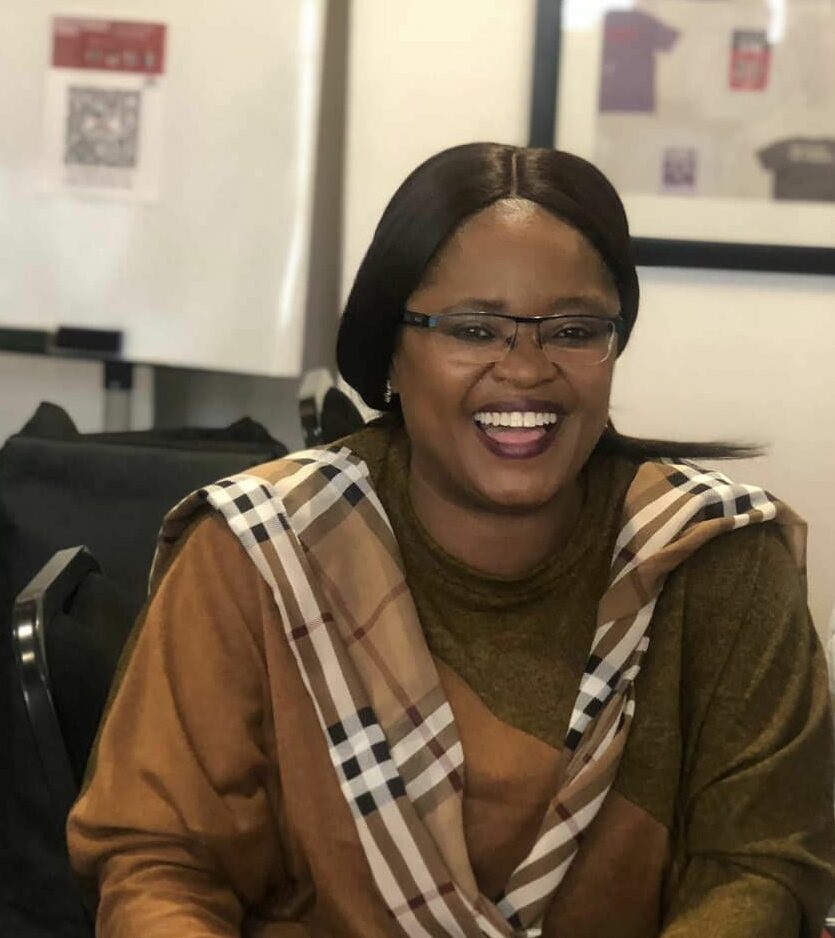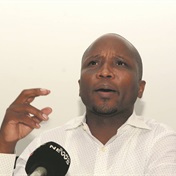
Fiery nurse activist Fikile Dikolomela-Lengene says she has had a front-row seat to corruption unfolding in Gauteng’s public health sector, and she is not afraid to speak out.
Dikolomela-Lengene grew up in the corridors of Chris Hani Baragwanath Academic Hospital in Soweto, Johannesburg – Africa’s largest health facility.
The youngest of nine siblings and the only daughter, her father died when she was three years old. After this, her mother, a nurse at Baragwanath hospital, would take her along to work.
“There were times when my mum didn’t have a nanny so she would take me to Bara [a nickname among healthcare workers for Baragwanath], where she worked in the same surgery theatre for 40 years,” says Dikolomela-Lengene. “I was actually sleeping on stretcher beds. I would accompany her to go fetch patients. This was a single mum with a little girl and nobody to look after her, and she needed to work.”
At the hospital, a young Dikolomela-Lengene grew inspired to become a nurse, while cultivating her first inkling of justice. “I saw what was happening, and I thought, this is something I would like to do,” she says. “It came with a lot of context of the profession. I mean, I saw my mum and how the profession didn’t upskill her, how she suffered because of having a child, the shifts, and all of that. And I think it’s where the love for professional activism came in. To say, if I go into this profession, I wanted to be in a place where I could influence change.”
Nurse activist
Today, with a string of qualifications behind her name, including a bachelor’s degree in nursing from North-West University and a Mandela Washington Fellowship for Young African Leaders, 36-year-old Dikolomela-Lengene describes herself as a “nurse activist”. Currently based at the Stretford Community Health Centre – which serves the township of Orange Farm in the south of Johannesburg – she is passionate about HIV care and heads several public health campaigns at a community level.
Commenting on the report findings of the Stop Stockouts Project (the SSP monitors shortages in essential medicines across South Africa) launched in August, Dikolomela-Lengene laments the shortfall of contraceptives – particularly injectable contraceptives and condoms – in the country’s public health sector.
“What is interesting to me is the non-acquiring of condoms, today in an era when HIV is so rife,” she says. “We ran out of [government-issued] condoms in May. And they actually don’t even have a new tender yet. And this shocked me. We should plan, right?”
She points out the ripple effects of this shortfall, such as an increase in required abortions. “Since there are none of these types of contraceptives, how has it impacted our TOP [termination of pregnancy] services, you know? Especially in clinics where these services are burdened as it stands?”
‘Rot of corruption”
Dikolomela-Lengene says “the rot” of corruption in Gauteng’s health sector runs deep.
In 2015, she was a founding member of The Young Nurses Indaba Trade Union (YNITU), which represented over 10 000 workers, who pay R70 per month for membership.
Dikolomela-Lengene alleged that the union’s leadership was “hijacked” at a congress in October last year and that millions of rands from the union’s coffers disappeared. Amid the clash, the union’s FNB business account was frozen in November 2021. However, allegedly, membership fees are still being paid into private accounts. AmaBhungane reported on the alleged hijacking of the trade union in September. The new leadership rejected claims of wrongdoing.
In February, Dikolomela-Lengene and fellow former union leaders put the allegations before the department of labour. “We told them we needed assistance because the union was hijacked and was being used for activities that currently… we actually don’t even know what is happening,” she says.
Dikolomela-Lengene adds that the union had been given notice to deregister on September 28. She will continue to meet with the department of labour. “Let me just say it’s been a hassle,” she adds. (AmaBhungane reported on the deregistration here.)
Last year in August, Gauteng health official Babita Deokaran was assassinated shortly after flagging up to R850 million in suspicious payments authorised at Tembisa Hospital in Johannesburg.
According to media reports, one of the people accused of capturing the YNITU – Lerato Mthunzi – is the wife of embattled Tembisa Hospital chief executive officer Ashley Mthunzi, who was suspended on August 26 over allegations of widespread corruption – including R498 000 of the hospital budget spent on 200 pairs of skinny jeans. After his suspension, one of Mthunzi’s notable supporters had been the nursing union, now headed by his wife. Lerato has denied any wrongdoing.
‘Defending and defending’
During the interview, Dikolomela-Lengene shakes her head, laughing.
“I’m laughing, you know because it’s so sad. People are defending and defending, but there’s a family here that lost somebody. There are kids currently who don’t have a mother because there are people in positions who don’t want to do their job.
“I don’t know how they’re going to get rid of corruption in health in Gauteng. You get to ask yourself, who authorises codes for jeans, skinny jeans, in a hospital? It’s like somebody’s mocking the governance.
“You have to ask yourself, how many processes are there before payment is actually made? So all those processes were flawed, or were people in those processes flawed themselves? And then, you have condoms not being on a tender. You start asking yourself [how are] people able to get money for jeans, but there’s no money for a tender for condoms?”
Looted
Shaking her head, Dikolomela-Lengene says the province’s health budget is being looted.
“We’re not going anywhere unless they actually bring a lot of people to account,” she says. “R850 million, imagine! I’m looking at my clinic. Our budget is around R20 million. How many clinics could have been revamped for R850 million? How many hospitals could have been looking A-class, private style, with that money? It is possible to revamp our clinics. It is possible to revamp our hospitals. There is money. There is money, but there is no political will.”
“Into the lion’s den”
On Gauteng’s new health MEC Nomantu Nkomo-Ralehoko, Dikolomela-Lengene says: “We’ll see with the new MEC. The past two MECs disappointed us and they were both health professionals.”
Nkomo-Ralehoko is not a healthcare professional by training.
“At this moment, I’m not going to be judgmental,” says Dikolomela-Lengene. “You know, we just want to see change. I mean, having to fight with a patient because you don’t have a Panado. You don’t have Panado! A simple thing like that. And as a nurse, you have to take the brunt of it. She’s [Nkomo-Ralehoko] going into a lion’s den. She will need a thick skin.”
Earlier this year, Dikolomela-Lengene was one of 700 young African leaders who studied in the US for six weeks as Mandela Washington Fellows. She was placed at Howard University, which counts former US President Barack Obama among its alumni.
“It’s what we call a historically black college, one of the colleges that Barack Obama went to. So I think that was an honour on its own,” she says.
As part of her training, she got to shadow and even debate with high-ranking US government officials. “I learnt a lot of skills, but what stood out was the ‘huddle system’. This is a programme whereby we have meetings more frequently so that changes can be made more frequently. I think in South Africa, we stick with things that are wrong for too long. If a policy isn’t working, we wait for five years. If a system isn’t working, we wait for five years. So with the huddle approach, you continuously monitor and make changes when things are not working.”
A 'downgrade' in nurse training
Dikolomela-Lengene lives in Johannesburg but says she prefers not to divulge particulars due to safety concerns.
She did, however, share her current reading material.
The book currently on her bedside table is Who Ate My Cheese? The Road to Freedom by Rowland Rose – a gift from the US embassy during her recent trip.
Another issue keeping Dikolomela-Lengene awake at night is South Africa’s nurse training curriculum. In 2019, she served on the ministerial task team that oversaw amendments brought to South Africa’s nurse training strategy, as chronicled in The National Strategic Direction for Nursing Education and Practice: A Road Map for Strengthening Nursing and Midwifery in South Africa (2020/21−2025/26).
She is highly critical of this new strategy, calling it a “big mistake”, and effectively a “downgrade” in nurse training in the country.
"I've got a four-year diploma. I've got a one-year post-graduate, [and] I've got a three-year degree. I'm not even going to talk about the side courses I've done. There are over 10. Can I tell you that I cannot access a university in South Africa? Our qualifications have been downgraded. I've got more than nine years of formal study and I can't do my Masters [degree] because my accreditation has been brought two to one level lower," says Dikolomela-Lengene.
“You've got academia and professors making a curriculum for nurses – not nurses. It's shocking... So there is a big fight between the national department of health, the SA Nursing Council, which is the regulatory body of nursing, and the department of higher education.”
The nurse activist says that her salary could triple if she moved from the public sector into the private, but she wouldn’t dream of such a step. “The passion I have for what I do is what fuels me,” she says. “And it’s effortless, you know? I love what I do. Whatever time they call me, I’m ready. I just show up – always.”
This article was published by Spotlight– health journalism in the public interest.




 Publications
Publications
 Partners
Partners









